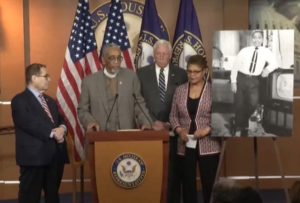Racism as a National Default Mechanism
In a speech regarding the Pigford lawsuit, Rep. Steve King implied that Obama supported the farmers because he is “very, very urban” and not because the USDA admitted its historical practice of discriminating against African-American farmers. The latest racial gaffe regarding our president came late last month from Rep. Steve King of Iowa.
The latest racial gaffe regarding our president came late last month from Rep. Steve King of Iowa. By way of a little background, King’s comment concerned Pigford v. Glickman, a massive class action lawsuit against the U.S. Department of Agriculture alleging racial discrimination in its allocation of farm loans and assistance to black farmers between 1981 and 1996. The USDA settled out of court in 1999, admitting to widespread racial discrimination against black farmers in its loan programs. About 15,000 farmers were paid a total of more than $900 million in the settlement, but tens of thousands of farmers filed claims after the deadline, and many charged that the government’s outreach had been insufficient and that they had incompetent legal counsel, causing them to miss their opportunity. In February 2010, President Barack Obama and Secretary of Agriculture Tom Vilsack promised an additional $1.15 billion to cover the remaining claims, which was appropriated by Congress this month.
In a speech regarding the Pigford lawsuit, King implied that Obama supported the farmers because he is “very, very urban” and not because the U.S. Department of Agriculture admitted its historical practice of discriminating against African-American farmers. According to The Huffington Post, “King emphasized the word ‘urban’ ” in his speech by “drawing the first syllable out.”
King’s word choice is very, very peculiar given that the case is about events that affected rural farmers. For clarity’s sake I looked the word up in the Oxford English Dictionary and confirmed that urban is still an adjective meaning “occurring or taking place in a city.” So why would King use it here? Was he trying to explain why an elected official from the city would support rural African-American farmers?
It doesn’t seem so. “Urban,” the way King used it, means reflecting inner-city social themes and attitudes or viewpoints chiefly associated with African-Americans. It’s not very different from Billboard’s category for pop music made by African-Americans and Latinos. It’s popular, but not mainstream. It’s affected by race. It’s urban.
This interpretation makes more sense when framed within the context of King’s other statements on Obama’s race and the Pigford case. On Dec. 1, King’s website described the case as a “fraud” because 94,000 African-Americans have submitted claims when the authorized compensation encompasses only 18,000. This simply isn’t true. Tens of thousands of farmers never had their claims considered because they missed the deadline due to bad legal advice. Congress passed legislation appropriating an additional $1.15 billion for these claimants.
On Nov. 30 he stated that Obama introduced “legislation to create a whole new Pigford claim.” Again, not true. The “new claim” was actually an act to make all injured parties whole, including those who didn’t get the best legal counsel because they couldn’t afford it or because the statute of limitations expired. Congress rectified this by passing a measure to waive the statute of limitations on civil rights cases for complaints made against the USDA between 1981 and 1996.
Going back a bit further, to July, King implied that the farmers were really after reparations for slavery. Also wrong. According to the Congressional Research Service, “(a) the largest USDA loans (top 1 percent) went to corporations (65 percent) and white male farmers (25 percent); (b) loans to black males averaged $4,000 (or 25 percent) less than those given to white males; and (c) 97 percent of disaster payments went to white farmers, while less than 1 percent went to black farmers.” These statistics reveal that the issue that’s being addressed is institutionalized discrimination and how it affects people’s lives and livelihoods today. The farmers were seeking equal funding by the USDA for work they did within their lifetimes, not for the unpaid work of their ancestors.
And in June King came under fire for telling G. Gordon Liddy that Obama supports the farmers because he “has a default mechanism in him that breaks down on the side of race, on the side that favors the black person.” To begin with, these comments describe black heritage as a blinding force and as a force that trumps Obama’s white heritage and logical function. In a nutshell, black heritage is a personal taint, and having a black president could be considered a national taint.
Though many would like to dismiss King’s comments as simple-minded or simply racist, I think that they reflect something much deeper about how race has been thought about, legislated and institutionalized in our nation. After all, stereotypes about African-Americans do not highlight intelligence over physical strength or emotion. And African-Americans of mixed race are thought to be plagued with psychological, social and emotional problems. This sad condition is reflected in other statements about Obama’s exceptional character despite his race made by politicians such as Harry Reid and pundits such as Chris Matthews. It seems that the most important thing about Obama remains the fact that he is black and not that he is president.
But we also need to think about the way race has been legislated as hypodescent, the automatic assignment of children of a mixed union between racial groups to the group with the lower status. So, because Obama checks “black” on the census and identifies as an African-American president, he can have “a default mechanism in him … that favors the black person” and not the person who has a just legal claim even if that party happens to be black. Rather than seeing Obama as falling on the white or black side, we should see him as falling on the sides of justice and equality for those discriminated against by the USDA.
All of this speaks to the larger issue of who gets to define what “side of race” Obama, the USDA or anyone else favors. It is striking that nobody is calling King’s opposition to the farmers and the president his “default mechanism of breaking down the side of race” in action. Maybe that’s because we really don’t believe that there is a default mechanism for the white side of race. Or, maybe it’s because the default mechanism for the white side of race is, in fact, our default.
Your support matters…Independent journalism is under threat and overshadowed by heavily funded mainstream media.
You can help level the playing field. Become a member.
Your tax-deductible contribution keeps us digging beneath the headlines to give you thought-provoking, investigative reporting and analysis that unearths what's really happening- without compromise.
Give today to support our courageous, independent journalists.






You need to be a supporter to comment.
There are currently no responses to this article.
Be the first to respond.